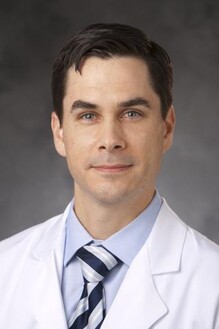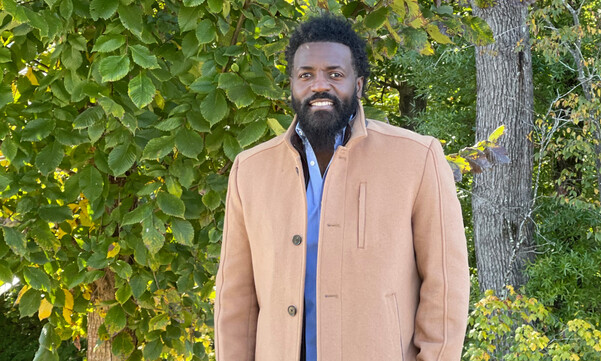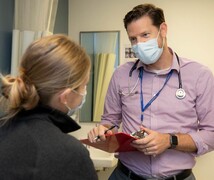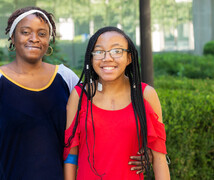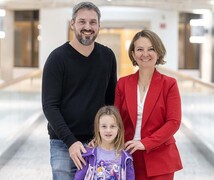Thanks to congenital heart disease, Dan Kummer had a heart transplant before he could even legally rent a car. His troubles returned 20 years later when his transplanted heart began to fail, even though he was in the best shape of his life. After a year on the transplant list with no new heart in sight, he went to Duke Health for a second opinion. His Duke surgeons’ expertise and access to new therapies got Kummer transplanted faster. Now, the 42-year-old fitness fiend is focusing on increasing his stamina and beating his heart surgeon’s Peloton ride times.
Watch Dan's journey to a new heart.
A Grim Diagnosis
Dan Kummer was born with several heart defects, including a condition called heterotaxy syndrome with dextrocardia, which meant his heart was on the right side of his chest, instead of the left. Doctors didn’t expect Kummer to live past kindergarten, but he stayed healthy until college. That’s when he started noticing troubling symptoms -- his skin was blue and pale, he was always tired, and he had trouble gaining weight.
At 22 years old, he flat-lined during a diagnostic heart catheterization and had to be brought back with defibrillator paddles. Afterward, Kummer was disappointed to learn he needed a heart transplant, but an encounter with a heart transplant recipient changed his perspective.
“My understanding of transplant really started to change,” Kummer said. “I was gung-ho and got my first transplant two or three weeks later.”
Heart Transplant Opens Door to Passion for Fitness
Kummer said he felt incredible after the transplant. “I'd never experienced what it was like to have enough oxygen in my body,” he said. He became passionate about physical fitness now that his body could keep up.
Around 2011, Kummer moved from New York to Charlotte, NC for work. During a routine cardiology appointment, Kummer was diagnosed with cardiac allograft vasculopathy (CAV) -- an aggressive type of heart disease that can develop in people who have had a heart transplant -- in 2018. The blood vessels supplying his heart had started to narrow and restrict blood flow. Medication helped slow the disease progression. Over the next year, Kummer upped his exercise regimen even more and became a Peloton enthusiast.
So it was quite a shock when Kummer learned at his next check-up that he would need another heart transplant soon. “It took us by surprise for sure,” Kummer said. “It was tough.” In December 2019, Kummer was officially added to the transplant waitlist.
Kummer’s health worsened as he waited for a donor heart. After a year of waiting, he came to Duke for a second opinion from Adam DeVore, MD, MHS, an advanced heart failure specialist and transplant cardiologist. While Dr. DeVore acknowledged that Kummer’s case was complex, Kummer said Dr. DeVore shared options that could get him a new heart faster.
“Because there are more people that need hearts than there are hearts available, with the current system, most people need to wait until they're very sick in the hospital -- sometimes on devices or IV medicines -- until they can actually find a suitable donor,” DeVore said. “That's why we really encouraged him to think about the other programs that we can offer. It gives us another pathway where there's much less competition for donor organs.”
Clinical Trial Advances Make More Hearts Available
Dr. DeVore offered Kummer a chance to participate in a clinical trial studying a process called donation after cardiac death (or DCD). Donation after cardiac death occurs after the donor’s heart has stopped beating (versus after brain death has been declared). An investigational device keeps the donor heart pumping outside of the body, which means it can stay viable longer and travel further. According to Dr. DeVore, both of these technologies expand the number of donor hearts available to people needing transplants.
Through the clinical trial, Kummer received a donor heart in November 2020, just two weeks after being officially listed at Duke, and nearly 20 years to the day after his first transplant.
Duke heart transplant surgeon Jacob Schroder, MD, lead the 10-hour procedure. Kummer’s recovery had hiccups, including a few rounds of ECMO (extracorporeal membrane oxygenation system) to allow his lungs to rest and recover. But after about a month in the hospital, Kummer was discharged and began a rehabilitation and physical therapy program.
A Race to the Top
Although Kummer was eager to start exercising again, he was hesitant to jump in too soon. His doctors encouraged Kummer to get back on his Peloton bike by competing with him virtually. That motivation was just what he needed.
“I'm going to eventually take down Dr. Schroder on Peloton. The man saved my life and put the heart in my chest, but I'll catch him,” Kummer laughed.
Now more than a year since his second transplant, Kummer said he’s looking forward to traveling more and spending time with family.
“We were at this state of mind prior to coming to Duke that we didn't even know if he was going to live long enough to get a heart,” said Kummer’s wife Kelly. “It was like our lives were given back to us when we came here. There's no better way to say it.”

